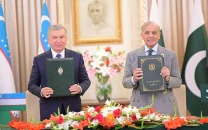Coalition formed to ensure free media
Journalist groups decide to jointly resist ‘attack on media from state or non-state actors’

Representatives of CPNE, AEMEND, various press clubs, unions and associations of journalists and media workers on Saturday established an alliance — Coalition for Free Media — to jointly resist media curbs through pressure tactics and trolling on social media and to ensure freedom of expression, a CPNE press release said.
Almost all groups and factions affiliated with media professionals, including Pakistan Federal Union of Journalists (PFUJ), Council of Pakistan Newspapers Editors (CPNE), All Pakistan Newspapers Employees Confederation (APNEC), press clubs of four provincial capitals and the National Press Club, attended a meeting where the initiative by the Association of Electronic Media Editors and News Directors (AEMEND) to form the “Coalition for Free Media” was endorsed by the participants.
The joint meeting also decided to establish a "steering committee" of the coalition to resist the continuous degradation of the freedom of information in the country. It decided to seek cooperation from human rights activists and lawyers and create deterrence over the safety of journalists and “shrinking space” for free speech in the media.
Read more: Honorary PhD conferred on poet, journalist
The meeting was moderated by AEMEND President Azhar Abbas, who after a consensus among the participants including those who had joined through an online link announced that freedom of speech did not mean unregulated and unethical media practices.
Fraternity decides to jointly resist “attack on media from state or non-state actors.”
The participants noted that character assassination of journalists on social and mainstream media had become a norm in recent years.
PFUJ (Barna) President Afzal Butt said many countries had placed curbs on media but it seemed too obvious and blatant in Pakistan. He believed that regressive policies were being followed, even by political parties, against media freedom.
Campaign to tarnish image
According to a statement issued by the coalition, successive governments, political parties and some state institutions have adopted the policy to defame independent journalists and tarnish their image through a sustained campaign.
Also read: Renowned journalist Ghouse Mohiuddin's funeral today
Unfortunately, it added, even some media persons and journalists also joined hands with powerful institutions in this campaign. Some TV channels and newspapers allegedly tried to justify such defamatory campaigns, accusing the media organisations and professional journalists of committing treason and even blasphemy, it noted.
“There is an urgent need to not only condemn this practice, but also to act collectively to put a stop to it,” the statement added.
Black sheep
It was agreed that media organisations and journalists could have different editorial policies and report the same stories differently, and there could be fair and justified criticism on these stories and opinions.
“But if media organisations start to run campaigns against journalists, they themselves are likely to become a threat to media freedom in this county,” the coalition warned.
The other key demands of the collation included “ensuring free speech and freedom of media” as no society can progress without free media. Freedom of speech generates dialogue and debate which is essential in every democratic society, it noted, recalling that journalists’ organisations have been campaigning long for this constitutional right.
Safety of journalists
Coalition members also discussed the issue of safety and protection of journalists. It noted scores of journalists have been killed, and several abducted or incarcerated by state and non-state actors, during the past many years.
At the same time, it noted, many continue to face pressures and persecution while performing their professional duties. It demanded the implementation of the “Protection of Journalists and Media Professionals Act” in letter and spirit.
The coalition decided to jointly resist any attack on media houses from state or non-state actors.
The participants agreed that there was undue pressure as well as demands to discontinue the publication of columns and articles of certain writers, or to stop airing certain television programmes, or to sack journalists and it had become the order of the day.
They noted that those resisting such undue pressures from the government and state institutions had often been subjected to different types of persecution, including stoppage of government advertisements and blocking of TV channel transmission. “This is completely unacceptable,” the coalition declared.



















COMMENTS
Comments are moderated and generally will be posted if they are on-topic and not abusive.
For more information, please see our Comments FAQ